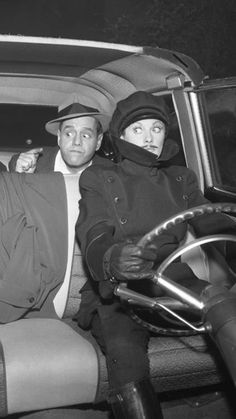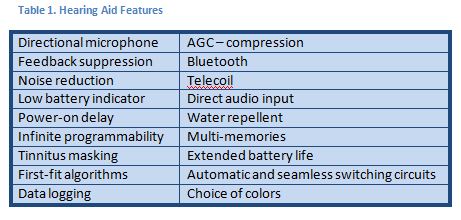Jerry Northern continues his analysis of the New Hearing Aid Consumer, a newcomer with more expectations and sophistication than buyers of the past. Today, Dr. Northern covers the dizzying array of technological features confronting those consumers as they attempt their due diligence.
As usual, Northern’s writing is user-friendly. His examples and use of Audiologists’ language touch on classical economic tenets such as Utility, diminishing marginal utility, and price elasticity of demand, without scaring Audiologists away. Readers will also want to review Dr. Northern’s views on the viability of Audiology, which appeared in two posts this summer .
Features Galore, and More
Do I really need all those things in my hearing aids?
Review the overwhelming number of advanced features shown in Table 1 and it is understandable why new buyers might wonder if such technologies will REALLY make a difference in their ability to hear. Or are they like new car features – “nice to have” — but not a necessity for driving?
Further, it does not take much for the potential buyer to realize that the hearing aid brands provided by the warehouse and the private office retailer include most of these same “advanced” features. So, they ask,
“What’s so special and what’s the big deal about ‘advanced technology’?”
Batteries and Individualized Care (Not) Included
Today’s buyers believe that Table 1’s advanced features should be included in ALL hearing aids and they do not expect to pay extra for them. On the other hand, I generally get a new buyer’s attention and understanding as I describe the individualized care provided by professional audiologists, which includes important counseling and follow-up care. Now the price differential begins to make sense, as this is clearly a valuable service not provided by online sellers and not easily visible in the warehouse protocol.
However, the real confusion for these buyers concerns the cost difference between the hearing aids sold by the warehouse provider and by the professional audiologist. The price comparison would be much clearer if the audiologist unbundled the hearing aid cost from other services; that would allow the buyer to see that the cost of the hearing aid is not that much different between the warehouse and the professional. The upcharge from the audiologist is for service components that go far beyond the hearing aid device itself. Those buyers who are committed to shopping by price may understand that the added value from the audiologist may well be worth the additional charges.
Audiologists Got Some ‘Splaining’ to Do to Consumers
My conversations with these hopeful buyers raise a number of issues that dispensing audiologists must face and resolve.
Point Them in the Right Direction . First and foremost is the blurring of lines between the various professionals and retail facilities that sell hearing aids; and unfortunately, to the general public, there is little apparent difference between the various types of providers and their wares – so it often comes down to a comparison of costs.
. First and foremost is the blurring of lines between the various professionals and retail facilities that sell hearing aids; and unfortunately, to the general public, there is little apparent difference between the various types of providers and their wares – so it often comes down to a comparison of costs.
There are many entry points now for the person seeking hearing aids who find themselves in a medical complex, an audiologist’s office, a university or hospital clinic, a big box or warehouse store, or they may give in and decide that an online purchase is the easiest way to go – perhaps unaware that the aids will need programming.{{1}}[[1]]As an aside, I was recently at my ophthalmologist’s office and was surprised to see a video in the waiting room promoting various brands of hearing aids and advising patients to ask about their hearing services – and, incidentally, this multi-eye doctor office has a sound booth and licensed dispenser.[[1]]
Tell Them What’s Unique About You and What You Do. The current changes in the traditional hearing aid dispensing systems call for innovative marketing to clearly differentiate the audiologist from other providers. Old marketing approaches will not capture the consumer’s attention. It is no longer just a question of marketing the product itself because the public sees every brand as an on-the-shelf commodity and not a special instrument.
Tell Them Why You’re Worth It. The differential pricing between warehouse hearing aids and private office bundled hearing service charges is difficult, if not impossible, for the savvy consumer to overlook. In addition to unbundling of prices to compete with the costs advertised by other providers, the audiologist’s marketing must emphasize the additional personal and individualized services as the justification for price differentials.
Jerry L. Northern, PhD, is Professor Emeritus at the University of Colorado School of Medicine where he served as head of the Audiology Department for more than 26 years. Dr. Northern, a native of Denver, is a prolific writer and editor of several professional journals; he has authored a dozen textbooks in the areas of hearing and hearing disorders, including six editions of Hearing in Children and three editions of Hearing Disorders. Internationally known for his expertise in pediatric audiology, his professional background includes clinical practice, teaching, medical-legal industry experience, clinical and basic research, as well as consulting in nearly 30 countries. Dr. Northern is a founding member of the American Academy of Audiology and served as the organization’s third president. He has been honored by numerous organizations for his contributions to the field of audiology.
images courtesy of pinterest, ranting and raving








The Hearing Aids fit in the Costco in Altamonte Springs Florida are by a licensed AuD Audiologist. This entire article is fanciful at best and extremely misleading. Best to consider joining a real buying group where every member is an NPI licensed Audiologist. Prices of Hearing Aids must come down to traditional venues of PP, ENT office, Hospital and University not just big box stores…. Or soon the only job will be retail and pay is the same degree or not… Cherry picking retail is what I call it… If that is the end game just keep doing the same thing for the next 5 years and at the rate AuDNet has tracked this the profession will have fallen down…